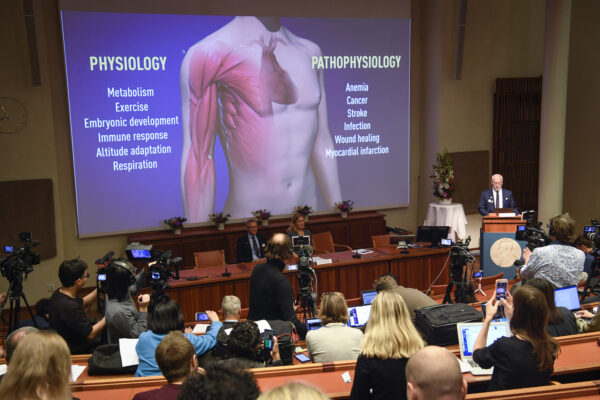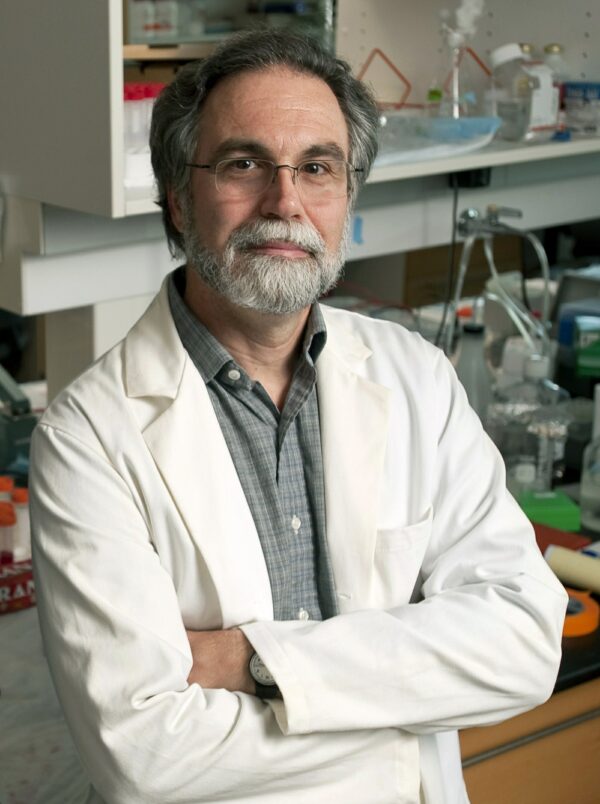LONDON—Two Americans and a British scientist won the 2019 Nobel Prize for Physiology or Medicine for discovering how the bodys cells sense and react to oxygen levels, work that has paved the way for new strategies to fight anemia, cancer and other diseases, the Nobel Committee said.
Drs. William G. Kaelin Jr. of Harvard University, Gregg L. Semenza of Johns Hopkins University and Peter J. Ratcliffe at the Francis Crick Institute in Britain and Oxford University will share equally the 9 million kronor ($918,000) cash award, the Karolinska Institute said.
It is the 110th prize in the category that has been awarded since 1901.
Their work has “greatly expanded our knowledge of how physiological response makes life possible,” the committee said, explaining that the scientists identified the biological machinery that regulates how genes respond to varying levels of oxygen.
That response is key to things like producing red blood cells, generating new blood vessels and fine-tuning the immune system.

The Nobel Committee said scientists are focused on developing drugs that can treat diseases by either activating or blocking the bodys oxygen-sensing machinery.
The oxygen response is hijacked by cancer cells, for example, which stimulate formation of blood vessels to help themselves grow. And people with kidney failure often get hormonal treatments for anemia, but the work of the new laureates points the way toward new treatments, Nils-Goran Larsson of the Nobel committee told The Associated Press.
Reached at his home, Kaelin said he was half-asleep Monday morning when the phone rang. It was Stockholm.
“I was aware as a scientist that if you get a phone call at 5 a.m. with too many digits, its sometimes very good news, and my heart started racing. It was all a bit surreal,” he said.
Kaelin said he isnt sure yet how hell spend the prize money but “obviously Ill try to put it to some good cause.” Kaelin is paid by the Howard Hughes Medical Institute, which also supports APs Health and Science Department with some grants.


Ratcliffe said he was summoned out of a meeting this morning by his secretary, who had “a look of urgency.”
“He had a Swedish accent, so I figured it probably wasnt one of my friends pulling my leg,” he said of the Nobel caller.
Trained as a kidney doctor, Ratcliffe said his research began when he and colleagues simply wanted to figure out how cells sense oxygen.
“I thought it was a definable problem and just thought wed find out how it worked,” he said. Ratcliffe said it was about two years into the research program that first began in 1990 when they realized the discovery had much wider significance.
“We saw that it wasnt just cells in the kidney that know how to sense oxygen, but all cells in the body,” he said. “They use this to do a huge range of other things, reprogram the cells, cause the growth of blood vessels, differentiation of cells. There are hundreds and thousands of processes the body uses to adapt to and regulate its oxygen levels.”


He said while some promising drugs have been developed, including for kidney patients who dont get enough oxygen, it will be years before its clear whether such discoveries are going to change the lives of tens of thousands.
Ratcliffe described his fellow laureates as “colleagues, competitors and friends.” He said felt honored by the Nobel accolade but that his main goal had always been pure science.
“The satisfaction is really finding things out that will continue to be true for all time,” he said. “This is for me an eternal truth and as a scientist, we work away, we find these things out and we hope they will be useful.”
Ratcliffe said he plans to have a celebratory party at the laboratory and later with his family. “A lot of people came to the office after the phone call and we had some champagne,” he said.
In Baltimore, Semenza said it was when he and colleagues were studying a gene in a rare cell type in the kidney and they did an experiment that showed the factor they discovered—which was linked to oxygen—that suggested it had widespread physiological importance. It turns out that the gene turns on erythropoietin, or EPO, which controls red blood cell production, when cells dont get enough oxygen.
“We found it very interesting that the body can respond to oxygen,” he told the AP. That discovery has led to treatments for people with chronic kidney disease who become anemic when their kidneys stop making EPO. “Now, drugs can turn on EPO production by increasing these factors.”


Semenza said it was likely one or more of these drugs will be approved for production in the next few years and that one has already been green-lighted in China.
Semenza has gone on to author more than 400 research articles and book chapters.
Andrew MurrayRead More – Source






















































